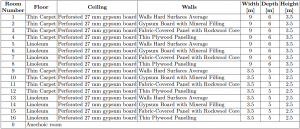VAST_KEMAR_0 dataset
Publication
Whenever using this dataset (for academic purpose only), please refer to the following paper:
Training Dataset
Below you will find links to download all or part of this VAST Training Dataset. Each room contains 54 spherical grids of source positions with 6 different radii (1, 1.5, 2, 3, 4 and 6 meters), centered at 9 different receiver positions (Middle, North, South, East, West, North-East, North-West, South-East, South-West). The receiver is always facing North and at height 1.7m. For a description of all 16 Rooms, see table below.
- TrainRoom0.mat (anechoic)
- VASTTraining.zip (all rooms)
Rooms:
- TrainRoom1.mat
- TrainRoom2.mat
- TrainRoom3.mat
- TrainRoom4.mat
- TrainRoom5.mat
- TrainRoom6.mat
- TrainRoom7.mat
- TrainRoom8.mat
- TrainRoom9.mat
- TrainRoom10.mat
- TrainRoom11.mat
- TrainRoom12.mat
- TrainRoom13.mat
- TrainRoom14.mat
- TrainRoom15.mat
- TrainRoom16.mat
Testing Datasets
Below you will find links to download files related to this VAST Testing Dataset.
VAST Testing Set 1:
In this dataset, the source and the receiver are randomly placed in the 3D rooms, except for the receiver’s height which is fixed at 1.7m. Each room contains 1,000 binaural RIRs. The receiver is always facing North.
- VASTTestingSet1.zip (all test sets)
- Test1Room1.mat
- Test1Room2.mat
- Test1Room3.mat
- Test1Room4.mat
- Test1Room5.mat
- Test1Room6.mat
- Test1Room7.mat
- Test1Room8.mat
- Test1Room9.mat
- Test1Room10.mat
- Test1Room11.mat
- Test1Room12.mat
- Test1Room13.mat
- Test1Room14.mat
- Test1Room15.mat
- Test1Room16.mat
VAST Testing Set 2:
In this dataset, the source and the receiver are randomly placed in the 3D rooms, except for the receiver’s height which is fixed at 1.7m. Each room contains 1,000 binaural RIRs. The receiver’s orientation (pan angle) is selected at random in [0,360°].
- VASTTestingSet2.zip
- Test2Room1.mat
- Test2Room2.mat
- Test2Room3.mat
- Test2Room4.mat
- Test2Room5.mat
- Test2Room6.mat
- Test2Room7.mat
- Test2Room8.mat
- Test2Room9.mat
- Test2Room10.mat
- Test2Room11.mat
- Test2Room12.mat
- Test2Room13.mat
- Test2Room14.mat
- Test2Room15.mat
- Test2Room16.mat
VAST Testing Set 3:
In this dataset, the source and the receiver are randomly placed in a 3D room of random width, length and height, such as the wall sizes are between 3x2m and 10x4m. The absorption profiles of each individual wall, floor and ceiling are picked randomly from the absorption profiles of the training set. The receiver’s height is fixed at 1.7m. The dataset contains 10,000 binaural RIRs. The receiver is always facing North.
VAST Testing Set 4:
In this dataset, the source and the receiver are randomly placed in a 3D room of random width, length and height, such as the wall sizes are between 3x2m and 10x4m. The absorption profiles of each individual wall, floor and ceiling are picked randomly from the absorption profiles of the training set. The receiver’s height is fixed at 1.7m. The dataset contains 10,000 binaural RIRs. The receiver’s orientation (pan angle) is selected at random in [0,360°].


